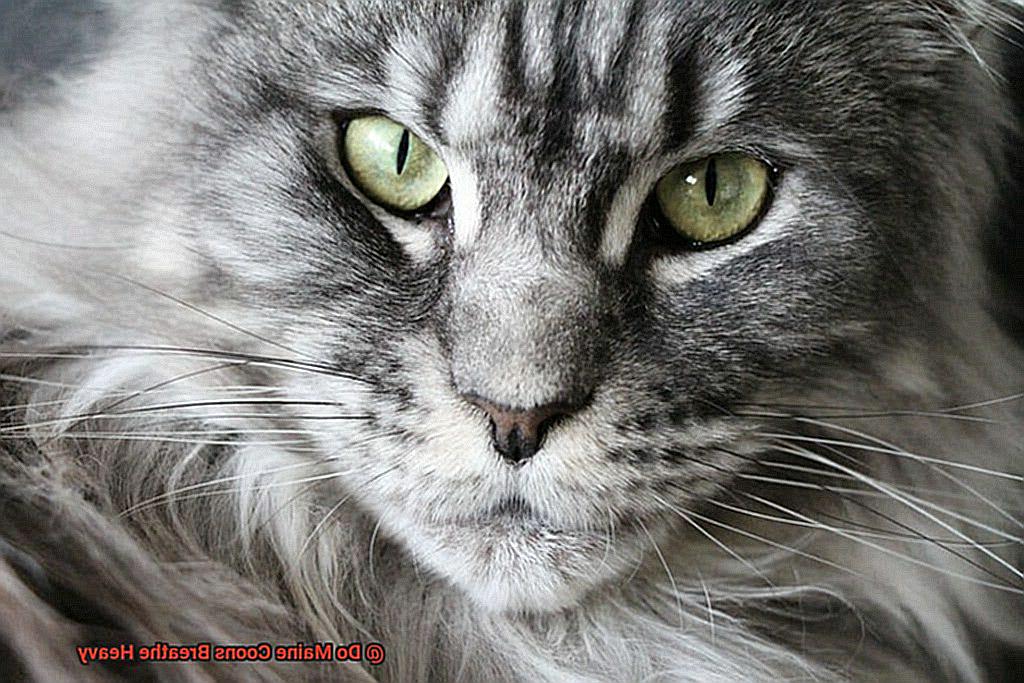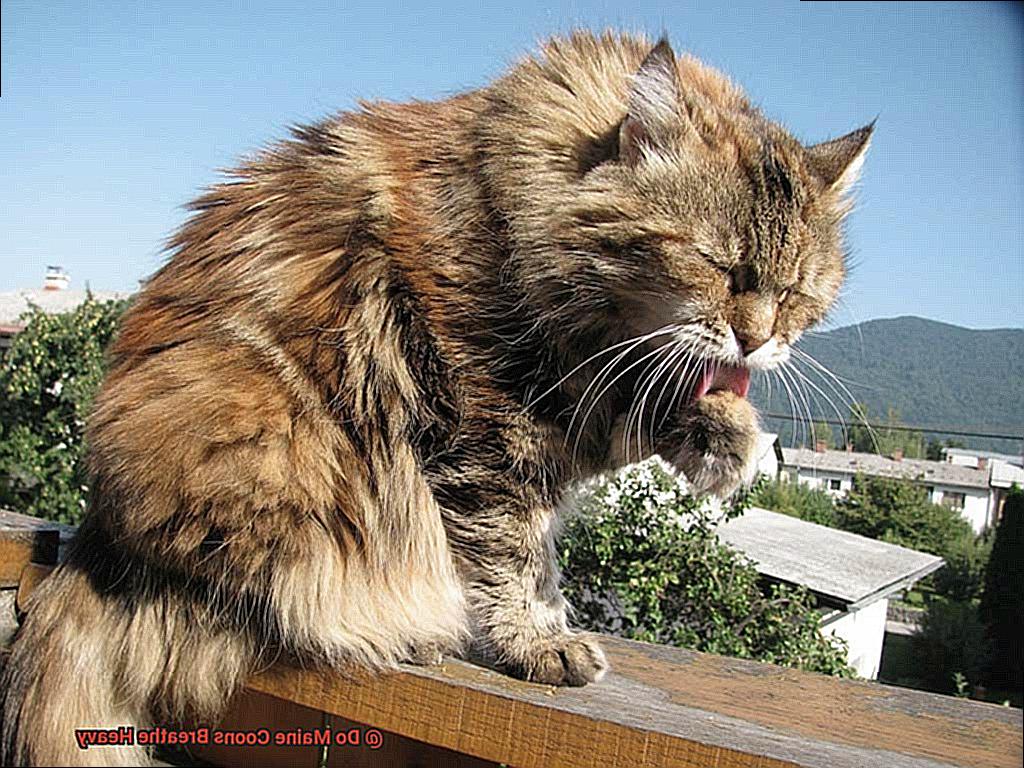Maine Coon cats are a majestic breed that have captured the hearts of many feline lovers. With their massive size and adorable tufted ears, these gentle giants are hard to resist. However, one question that often arises is whether Maine Coons breathe heavily or not. As a feline health expert, I’m here to provide you with all the facts and debunk any myths surrounding this topic.
While Maine Coons have a muscular build, heavy breathing in cats can be an indication of underlying health issues. If your furry friend is panting excessively or wheezing, it could be due to respiratory distress, heart disease, or even obesity. Therefore, it’s crucial to keep an eye on your Maine Coon’s breathing patterns and seek veterinary attention if anything seems out of the ordinary.
This blog post will answer the burning question of whether Maine Coons breathe heavily or not and provide you with essential information as a pet owner. We’ll dive into the factors that can impact your cat’s breathing patterns and explore potential health problems that may cause heavy breathing. By the end of this article, you’ll have all the knowledge necessary to ensure your beloved Maine Coon is breathing easy and living their best life.
Do Maine Coons Breathe Heavily?
Maine Coon cats are much more than just a large and fluffy feline companion. They are known for their gentle nature, playful spirit, and striking appearance. However, as with any breed, there are health concerns to keep in mind – one of them being heavy breathing or respiratory problems.
Heavy breathing in Maine Coons can be a symptom of several underlying health issues. Obesity is one of the most common reasons for heavy breathing in these cats. Overeating can lead to excessive weight gain, which can put pressure on their respiratory system. Maintaining a healthy weight through proper diet and exercise is vital for your cat’s overall health.
Heart disease is another potential cause of heavy breathing in Maine Coons. This breed is predisposed to specific heart conditions, such as hypertrophic cardiomyopathy, which can make breathing difficult. Regular check-ups with a veterinarian can help detect and manage these conditions early on.
Asthma and allergies can also contribute to heavy breathing in Maine Coons. Cats with sensitive airways can experience respiratory symptoms triggered by environmental factors such as dust, pollen, or smoke. Your vet may recommend medication or environmental modifications to alleviate these symptoms.
As a Maine Coon parent, it is crucial to monitor your cat’s breathing patterns and seek veterinary care if you notice any abnormalities. Regular exercise and maintaining a healthy diet can also help prevent obesity-related breathing problems in Maine Coons.
Causes of Heavy Breathing in Maine Coons

Maine Coons are a magnificent breed of cats, known for their muscular bodies and fluffy coats. However, if you are a Maine Coon owner, it is essential to be aware of heavy breathing in your furry friend. Heavy breathing in Maine Coons can be caused by several factors, and as an expert in the field, I am here to guide you through them.
Obesity is one of the most common causes of heavy breathing in Maine Coons. Extra weight can put pressure on their lungs and make it difficult for them to breathe normally. A healthy weight management routine can help alleviate this problem and keep your feline friend healthy and happy.
Respiratory issues such as asthma or bronchitis can also cause heavy breathing in Maine Coons. These conditions may worsen in the presence of environmental factors such as smoke, dust, or pollen. It’s important to monitor your cat’s breathing patterns and seek veterinary care promptly if you notice any abnormalities.
Heart problems can also lead to heavy breathing in Maine Coons. Fluid buildup in the lungs due to heart disease or heart failure can make it harder for your cat to breathe properly. Regular check-ups with your veterinarian can help detect any heart problems early on.
Finally, stress or anxiety can also cause heavy breathing in Maine Coons. If your cat is feeling anxious or stressed, they may breathe more rapidly or heavily than usual. Creating a peaceful and comfortable environment for your cat and addressing any underlying anxiety issues can help alleviate this problem.
As a responsible Maine Coon owner, it’s crucial to keep an eye on your cat’s breathing patterns regularly and seek veterinary care if necessary. Treatment for heavy breathing will depend on the underlying cause and may include weight management, medication, or lifestyle changes.
Asthma as a Cause of Heavy Breathing in Maine Coons
Maine Coons are known for their size and beauty, but they’re not immune to respiratory issues that can cause heavy breathing. One of the most common causes of heavy breathing in Maine Coons is asthma – a chronic respiratory disease that affects the bronchial tubes and makes it difficult for air to move in and out of the lungs.
This condition can result in uncomfortable symptoms such as coughing, wheezing, and shortness of breath, which can leave your feline friend feeling miserable. Unfortunately, Maine Coons are particularly prone to developing asthma due to their large size and genetic predisposition for respiratory issues.
If you suspect that your Maine Coon may have asthma, it’s essential to seek veterinary care promptly. Your vet will perform a physical exam and diagnostic tests to confirm the diagnosis and develop an effective treatment plan tailored to your cat’s specific needs.
Treatment for feline asthma usually involves a combination of medications and lifestyle changes. Your vet may prescribe corticosteroids or bronchodilators to reduce inflammation and improve airflow, as well as recommend environmental changes like reducing exposure to allergens or irritants.
With proper treatment, most Maine Coons with asthma can enjoy a happy and healthy life. However, it’s crucial to monitor your cat’s breathing patterns closely and seek veterinary care if you notice any changes or signs of respiratory distress.

Obesity as a Cause of Heavy Breathing in Maine Coons
Yes, it’s true – excess weight can hinder your cat’s breathing and put them at risk for various health issues.
So, how exactly does obesity cause heavy breathing in Maine Coons? The answer is simple – carrying extra pounds puts pressure on your cat’s lungs and diaphragm, making it difficult for them to breathe properly. This can be particularly problematic when they’re under physical stress or feeling anxious. Over time, heavy breathing due to obesity can lead to severe health problems like heart disease, diabetes, and joint issues.

Fortunately, you can take several steps to prevent obesity and tackle any heavy breathing your Maine Coon may already be experiencing. The first step is closely monitoring their weight and ensuring they consume a balanced diet. Just like humans, overeating and consuming too many calories can lead to weight gain. So, make sure their food is high-quality and appropriate for their age and activity level.
Regular exercise is also crucial for preventing obesity in Maine Coons. These cats are known for their size and strength and require plenty of opportunities to stay active. Consider purchasing toys that promote physical activity such as cat trees or interactive toys that encourage playtime.
If your Maine Coon is already overweight and experiencing heavy breathing, don’t panic. Work with your veterinarian to develop a safe and sustainable weight loss plan. This may include changes in diet and gradually increasing exercise over time. It’s important not to rush the process as sudden weight loss can put undue stress on your cat’s body.
Lastly, if heavy breathing persists despite efforts to address obesity, seek veterinary care to identify any underlying health issues. Respiratory infections, allergies, or heart conditions can all cause heavy breathing, so it’s essential to rule out these possibilities with the help of a professional.
lv1vE5PNLI0″ >
Prevention and Treatment of Heavy Breathing in Maine Coons
This common issue can be caused by a range of factors, including obesity, heart disease, respiratory infections, and other health problems. The good news is that with proper care, heavy breathing can be prevented and treated.
One of the key prevention strategies is to ensure that your Maine Coon maintains a healthy weight. Obesity is a significant contributor to respiratory problems that can strain your cat’s breathing system. To prevent this, make sure you’re not overfeeding your cat and provide them with a balanced diet that meets their nutritional needs.
Another crucial aspect to consider is your cat’s environment. Allergens such as dust, pollen, and other irritants can cause respiratory infections or trigger allergies that lead to heavy breathing. To minimize the risk of these problems, keep your house clean and well-ventilated by regularly cleaning the litter box, vacuuming carpets and upholstery, and ensuring there’s fresh air circulating in the room.
If you notice that your Maine Coon is struggling with heavy breathing, don’t hesitate to get medical attention immediately. Your veterinarian will perform a thorough examination to establish the underlying cause of the problem. Depending on the diagnosis, treatment options may include medication to manage heart disease or surgery to correct anatomical abnormalities.
Also Read: Why Does My Cat Breathe Heavy? – 21Cats.org
Conclusion
In conclusion, it’s crucial for Maine Coon owners to keep a close eye on their cat’s breathing patterns. Heavy breathing can be a red flag for underlying health issues that require immediate attention. As a responsible pet owner, you need to take prompt action if you notice any abnormalities in your cat’s breathing.
Obesity is one of the most common culprits behind heavy breathing in Maine Coons. Keeping your cat at a healthy weight through proper diet and exercise can go a long way in preventing respiratory distress. Additionally, respiratory issues such as asthma or bronchitis can also cause heavy breathing in cats, while heart problems may lead to fluid buildup in the lungs.
Stress and anxiety are other factors that may contribute to heavy breathing in Maine Coons. It’s important to create a peaceful environment for your cat and minimize exposure to allergens.
To prevent heavy breathing and ensure your Maine Coon stays healthy, make sure you monitor their weight closely and keep their living space free from irritants. If you do notice signs of respiratory distress, don’t hesitate to seek veterinary care immediately. Treatment options may include medication or surgery depending on the underlying cause.
By taking proactive steps and seeking medical attention when needed, you can help your furry friend live a happy and healthy life without any respiratory issues.







